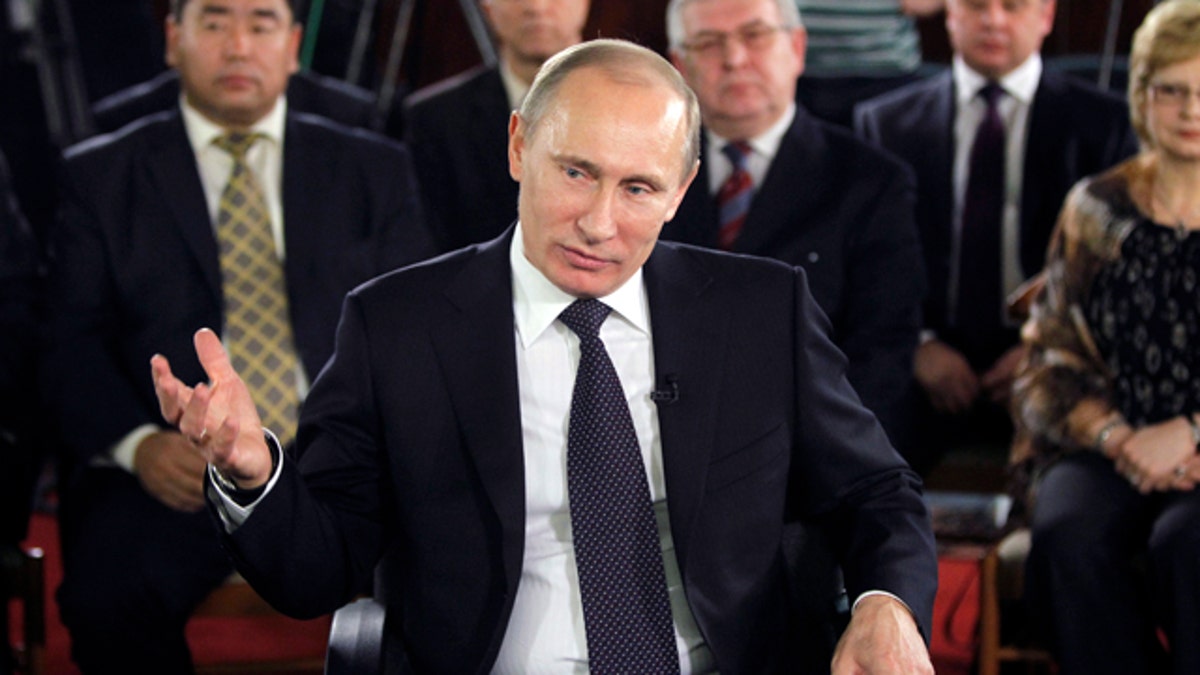
Dec. 6: Prime Minister Vladimir Putin called his party's seat losses "inevitable." (AP)
MOSCOW – Police clashed Tuesday on a central Moscow square with demonstrators trying to hold a second day of protests against alleged vote fraud in Russia's parliamentary elections.
Hundreds of police had blocked off Triumphal Square on Tuesday evening, then began chasing about 100 demonstrators, seizing some and throwing them harshly into police vehicles.
Pro-government United Russia supporters also rallied late Tuesday at Revolution Square near the Kremlin. State television footage showed a crowd appearing to number in the thousands.
Prime Minister Vladimir Putin's United Russia party saw a significant drop in support in Sunday's election but it will still have a majority in parliament. Opponents say even that watered-down victory was due to massive vote fraud.
In neighboring Lithuania, U.S. Secretary of State Hillary Rodham Clinton again criticized the Russian election and urged that widespread reports of voting fraud be investigated.
Some Moscow demonstrators Tuesday shouted "Putin is a crook and a thief!" referring both to the alleged election fraud and to widespread complaints that United Russia is one of the prime reasons for Russia's endemic corruption.
Among the detained was Boris Nemtsov, a leader of the liberal opposition, along with prominent radical Eduard Limonov and Oleg Orlov, head of the renowned human rights group Memorial, the Interfax news agency reported.
Hundreds of young men with emblems of United Russia's youth wing, the Young Guards, also gathered on the outskirts of the square and tauntingly chanted "Putin victory!"
Large crowds also gathered on a square in St. Petersburg, visibly outnumbering police, a Danish election observer reported.
United Russia won slightly less than 50 percent of Sunday's vote, according to nearly complete preliminary results. Although that gives the party an absolute majority in the State Duma, the lower house of parliament, it is a significant drop from the 2007 election when the party got a two-thirds majority, enough to change the constitution unchallenged.
Yet Sunday's election results reflected public fatigue with Putin's authoritarian streak and with official corruption in Russia, signaling that his return to the presidency in next March's election may not be as trouble-free as he expected.
Putin, meanwhile, called his party's reduced number of seats in Sunday's parliamentary election an "inevitable" result of voters always being dissatisfied with the party in power. Putin also dismissed allegations of corruption among his United Russia party members, calling it a "cliche" that the party had to fight.
United Russia party won slightly less than 50 percent of Sunday's vote, according to nearly complete preliminary results. Although that gives the party an absolute majority in the State Duma, the lower house of parliament, it is a significant drop from the 2007 election when the party got a two-thirds majority, enough to change the constitution unchallenged.
Even that smaller majority is seen as questionable in the wake of numerous reports of voting fraud to inflate United Russia's total. Russian officials, however, have denied any significant vote violations.
Still, the election results reflected public fatigue with Putin's authoritarian streak and with official corruption in Russia, signaling that his return to the presidency in next March's election may not be as trouble-free as he expected.
Russia's beleaguered opposition has been energized by the vote. Late Monday, thousands marched in Moscow chanting "Russia without Putin!"
That demonstration apparently caught authorities by surprise, and police and troops on Tuesday substantially increased their visibility in an apparent effort to discourage more gatherings.
Police detained about 300 protesters in Moscow on Monday and 120 participants in a similar rally in St. Petersburg. Two of the Moscow rally's leaders, Ilya Yashin and Alexei Navalny, were sentenced to 15 days in jail Tuesday.
Security forces already had been beefed up in the capital ahead of the election. Moscow police said 51,500 Interior Ministry forces were involved, all part of increased security for the election period.
Putin's comments Tuesday appeared to aim at saving face and discouraging the opposition from seeing United Russia as vulnerable.
"Yes, there were losses, but they were inevitable," Putin said at a meeting of party supporters. "They are inevitable for any political force, particularly for the one which has been carrying the burden of responsibility for the situation in the country."
Putin also rejected the popular characterization of United Russia as "the party of crooks and thieves," saying corruption was a widespread problem not limited to a single party.
"They say that the ruling party is associated with theft, with corruption, but it's a cliche related not to a certain political force, it's a cliche related to power," he said during a meeting with provincial officials.
"What's important, however, is how the ruling government is fighting these negative things," he said.
Clinton criticized the Russian vote for a second straight day, saying Tuesday that "Russian voters deserve a full investigation of electoral fraud and manipulation."
Konstantin Kosachev, a senior United Russia member, described Clinton's statement as "one of the darkest pages in the Russian-U.S. relations" and warned Washington against supporting the opposition.
Russia's only independent election monitoring group, Golos, which is funded by U.S. and European grants, came under heavy official pressure ahead of Sunday's vote after Putin likened Russian recipients of foreign support to Judas. Golos' website was incapacitated by hackers on election day, and its director Lilya Shibanova and her deputy had their cell phone numbers, email and social media accounts hacked.
The Russian election even drew criticism from one of Putin's predecessors.
"There is no real democracy here and there won't be any, if the government is afraid of the people," former Soviet leader Mikhail Gorbachev said on Ekho Moskvy radio.
